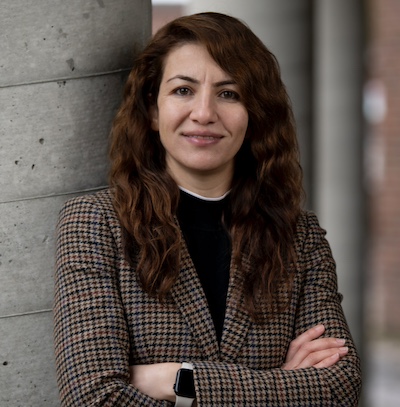All about our new faculty members joining this school year!

Juan Hu
Assistant Professor, Department of Chemistry
Juan Hu earned her doctoral degree in chemistry from Auburn University. She
subsequently joined the Department of Chemistry at Scripps Research for postdoctoral training under Professor Brian M. Paegel, later moving with the Paegel Laboratory to UC Irvine.
Hu is dedicated to developing analytical methods and models to study cell membrane permeability and identify molecules that facilitate this process. Membrane bilayers surround every living cell, regulating the passage of nutrients and wastes. Certain molecules, especially well-designed drugs, can permeate the membrane to affect cellular functions. The Hu Lab’s research aims to enhance our understanding of membrane permeation characteristics and guide the design of novel therapeutic molecules with improved pharmacokinetic profiles.

Joann Chen
Assistant Professor, Department of Computer Science
Joann Chen is a new faculty member in the Department of Computer Science. Prior to her arrival at SDSU, Joann completed her Ph.D. at UC Irvine. Her research interests center around Differential Privacy (DP), privacy-enhancing technologies, and privacy in machine learning.
Joann has experience in quantifying privacy risks in machine learning and integrating DP into DNS resolution, data stream release, resource allocation, ad conversion measurements, and network data synthesis. Her research aims to bridge the gap between DP theory and its practical applications for real-world deployments.
Joann is deeply committed to teaching and mentoring future scientists. In her free time, she enjoys reading, pottery, crocheting, and hiking.

Salimeh Sekeh
Associate Professor, Department of Computer Science
Prior to joining SDSU’s Computer Science Department, Salimeh Sekeh was an assistant professor of computer science at the University of Maine (UMaine) from 2019-2024. She joined UMaine from Michigan, where she was a postdoctoral research fellow from 2016-2019. She held CAPES-PNPD Post-Doctoral Fellow appointment with the Federal University of São Carlos (UFSCar), Brazil, in 2014 and 2015. She was a Visiting Scholar with the Polytechnic University of Turin, Turin, Italy, from 2011 to 2013. Salimeh was a recipient of CAREER award and CISCO research gift both in 2022. In addition, she received the Maine College of Engineering and Computing (MCEC) Early Career Research Award in 2023.
Salimeh’s research has been funded through NSF, Cisco, UMaine AI initiative, Maine Space Grant Consortium (MSGC)/NASA, and UMaine Space Initiative. Her research interests are at the intersection of machine learning and computer vision, with a particular focus on the foundation of deep learning models and representation learning in feature map perception problems. Her primary focus is in design, improvement, and analysis of deep learning techniques with emphasis on efficiency and robustness. Further, she works on continual learning methods, adversarial robustness, domain adaptation, and graph summarization. From the applied side of her research, Salimeh and her team have focused on both interdisciplinary and multidisciplinary projects with a strong contribution to understanding and prediction of real-world problems such as forestry, agriculture, biological imaging, healthcare, and robotics. Her work has been published in IEEE Trans. on Neural Networks and Learning Systems (TNNLS), IEEE Trans. on Signal Processing, IEEE Trans. on Intelligent Vehicles, ECCV, ICLR, ICPR, BMVC, ICASSP, ISIT, and other AI/ML journals and conferences.
Salimeh is also passionate about teaching and mentoring the next generation of scientists, and increasing diversity in computer science. In her free time, she enjoys hiking and traveling as well as cooking.

Rob Beverly
Professor, Department of Computer Science
Director, SDSU Cybersecurity Center of Excellence
Professor Beverly is an applied cybersecurity researcher with a passion for understanding, breaking, and hardening real-world systems. His work employs large-scale measurement, machine learning, and data analytics to improve the security, privacy, and resilience of networked systems and critical infrastructure. Recent research from Dr. Beverly’s lab explores inter-domain routing vulnerabilities, infrastructure robustness, and network protocol privacy, security, and design.
Dr. Beverly joins SDSU from the National Science Foundation (NSF) where he was a Program Director managing the cybersecurity portfolio within the Office of Advanced Cyberinfrastructure and a faculty member in the Computer Science department at the Naval Postgraduate School in Monterey, CA. He received his PhD in EECS from MIT and BCmpE from Georgia Tech. In his free time, he enjoys trail running the California coast, spending time with his family, skiing, and tinkering with old European cars.
Rob is excited to lead SDSU’s cybersecurity initiative as the founding director of the Cybersecurity Center of Excellence, which seeks to engage students and interdisciplinary faculty to tackle critical national and societal cybersecurity challenges, and serve as a regional catalyst to produce high-quality and diverse cybersecurity professionals and researchers.

Stathis Charalampidis
Assistant Professor, Department of Mathematics & Statistics
Stathis Charalampidis is an applied and computational mathematician, and is excited to join SDSU’s Department of Mathematics and Statistics as an Assistant Professor this Fall! Prior to his arrival at SDSU, he was an Assistant Professor in the Mathematics Department at Cal Poly San Luis Obispo. He earned a PhD in applied mathematics from the Aristotle University of Thessaloniki, Greece, and pursued postdoctoral studies at the University of Massachusetts (UMass) Amherst, where he was later appointed Lecturer and Chief Undergraduate Advisor for Mathematics majors.
His research interests revolve around computational studies of complex nonlinear dynamical systems arising in mathematical physics, condensed matter physics, nonlinear optics, materials science, and fluid mechanics. He is currently the PI of an NSF research grant that focuses on the development of computational techniques for studying collapse-type phenomena and rogue waves in nonlinear dispersive PDEs. In the summer of 2023, he was a CNRS Visiting Professor at the Laboratoire de Mathematiques Raphael Salem in Rouen, France in order to develop parallel finite-element toolboxes for the computation of matter waves in nonlinear PDEs. He has mentored 21 undergraduate and 4 graduate researchers, 1 postdoctoral research scholar, and is particularly proud of having undergraduate students as co-authors in 5 of his research papers. He is passionate about teaching, and has taught a variety of undergraduate and graduate courses at UMass and Cal Poly.
As a first-generation college graduate, he understands the value of affordable public higher education, and is committed to promoting diversity, equity and inclusion while serving as an ambassador for the field of Computational and Applied Mathematics. In his spare time he enjoys hiking, traveling, and playing the electric and acoustic guitar.

Victoria Delaney
Assistant Professor, Department of Mathematics & Statistics
Victoria Delaney (she/her) is an educator interested in the intersection of data-driven mathematics, technology, and teaching. She studies secondary teachers’ enactments of mathematics, statistics and data science curricula with their students, and the ways in which their teaching is informed and shaped by emergent technologies. Recently she has become interested in how educators and students come to understand artificial intelligence and how it influences learning in secondary mathematics classrooms.
Her research interests are shaped by her own experiences teaching in high schools. Prior to developing her research program, she taught statistics, calculus, algebra, and robotics in three different U.S. states, which enabled her to see how state and local policies influence schooling. When she taught in the South, she further learned how access to emergent technologies can alter students’ opportunities to learn, including obstructing their learning in cases where resources and/or education systems were insufficient to meet students’ needs.
Through her current program of research, she seeks to equip secondary teachers with technologies and pedagogies that will allow them to enact ambitious and equitable STEM instruction. She received her doctorate from Stanford University, studying mathematics education, the learning sciences, data science, and computer science, under the mentorship of Hilda Borko and Victor R. Lee.

Wiston Rodriguez
Assistant Professor, Department of Psychology
Dr. Rodriguez’s research program aims to promote healthier and more equitable workplaces for employees with two broad themes: occupational health psychology (OHP) and diversity, equity, and inclusion (DE&I). Specifically, he uses a quantitative approach to: (1) understand the impact of various workplace stressors on employee health and well-being, as well as potential antecedents of these workplace stressors, and (2) investigate the unique experiences of LGBTQ+ employees in the workplace and the impact of these experiences. His research has received funding from The National Institute for Occupational Safety and Health (NIOSH) and has appeared in peer-reviewed journals such as Personality and Individual Differences, Organizational Psychology Review and Stress and Health.
In addition to being a productive research scholar, Dr. Rodriguez has managed to stay active as a practitioner. Specifically, he has applied experience working with global and Fortune 500 organizations in the areas of talent management, learning and development, assessment, and applied consulting.
As a native Californian and alumnus of SDSU, he’s especially happy to be closer to family and to be back at SDSU. Outside of work, Dr. Rodriguez enjoys traveling to new places, working out, and spending time at the beach.

Jane Leer
Assistant Professor, Department of Psychology
Jane Leer is a developmental psychologist whose research focuses on contextual, cultural, and policy influences on child and adolescent development. She has two main lines of research: (1) How do neighborhood, school, and family contexts shape developmental processes such as youth mental health, academic engagement, and social cognition? and (2) How can social policies that aim to alter these contexts more equitably serve diverse populations and mitigate structural inequality? These two lines of work are linked by their focus on the intersections between macro-system (e.g., racism, classism, sexism) and micro-system (e.g., neighborhood, family, school) contexts, and their use of a strengths-based perspective.
Prior to SDSU, Dr. Leer completed an NIH-funded postdoctoral research fellowship at Boston College, where she worked on a natural experiment evaluating the impact of public housing redevelopment on residents’ health and wellbeing. She holds a joint doctoral degree in Psychology and Public Policy from Duke University, and 10+ years of applied research experience working with policymakers, NGOs, teachers, and social workers in Latin America, West Africa, and the United States to evaluate social policies and programs.
At SDSU, she is excited to launch a lab focused on community-based, policy-relevant psychological science with student researchers. A native Californian (from Humboldt County), she is thrilled to be coming home!